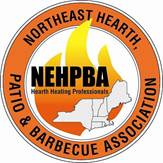8 September 2021

September 8, 2021
FOR IMMEDIATE RELEASE
Punishing weather is a reminder on importance of energy diversity. Electric power grid is highly vulnerable to Mother Nature.
NEHPBA: Preserving access to natural gas and other fuel sources is critical for emergency readiness in major weather events. Power loss can threaten lives in winter.
Sudbury, MA – The Northeast Hearth, Patio and Barbecue Association today urged residents across New England and the Northeast to take extra safety precautions in the wake of a punishing tropical storm that downed power lines, caused dangerous flash floods, and littered roads and other public ways with fallen trees and branches across the region.
More than 200k households in the Northeast were without power Thursday morning following hours of torrential rain and heavy winds as the remnants of Hurricane Ida arrived in the Northeast as a still-violent tropical storm. The burst of dangerous weather is a stark reminder that America’s power grid is most vulnerable to failure when Mother Nature delivers overwhelming storm conditions.
“It’s the season when we expect hurricanes and tropical storms. But it’s still a huge challenge for electric utilities to defend against nature’s most brutal weather,” said Joel Etter, President of NEHPBA and Senior Wholesale Account Manager for Hearth & Home Technologies. “America’s power grids were simply not built to withstand these kinds of storms on a continual basis. Our electric power infrastructure is aging and increasingly unreliable under severe conditions.”
The U.S. Department of Energy says the number of power blackouts is increasing, and that hurricanes and other extreme weather events are the biggest threat to electric grids. The availability of multiple energy sources to consumers and businesses is one strong defense mechanism – both in this tropical storm season as well as in the dangerous cold of winter.
NEHPBA is part of a cross-section of industry associations and advocates fighting to maintain energy diversity in the marketplace – as special interests support initiatives to ban natural gas, complicate regulations around propane and wood-burning fuel products and limit choices for home-heating systems. The industry is working together with other businesses as well as consumers to ensure natural gas continues to be available in New England and the Northeast as part of a complete range of energy choices.
“This hurricane season will be a major challenge along the entire East Coast. But in New England and the Northeast, our most dangerous weather is still most often during the winter,” said Karen Arpino, Executive Director of NEHPBA. “The winds, heavy snow, and ice from a big N’Oreaster routinely knock out power to tens of thousands of households at a time. Every year we see people placed in real danger because their heating system is reliant solely on electricity.”
Survey data commissioned by the nationwide Hearth, Patio and Barbecue Association in November 2020 found 65 percent of American voters polled believe it’s either “very important” or “somewhat important” to have multiple fuel choices for home heating. Additionally, 71 percent of voters surveyed said it was either “very important” or “somewhat important” to keep their home heating system without being forced to switch fuel types.
NEHPBA recognizes the changing landscape of the energy and fossil fuel industry. Its members and leadership are committed to working with government officials and regulators at all levels to increase access to more sustainable and climate-centric fuel sources throughout the region’s homes and businesses. However, NEHPBA has expressed about the hyper-focus on electric heat through heat pumps. Currently, in the Commonwealth of Massachusetts alone, 50.6 percent of homes (1.3 million individual households) heat with natural gas; and 27 percent (700,000+ households) heat with oil. Allowing homeowners energy choice and energy diversity is important in the northeast where power outages as a result of winter weather are very common. Heat pumps lose efficiency once temperatures dip below 40 degrees and are no longer the most efficient heating option once temperatures fall to 25 to 30 degrees.
“Banning new natural gas connections or curbing existing use dramatically will hurt Americans when costs of living are already high. It’s important for consumers and business to be united in opposing such proposals at the local and state level,” said Luther. “An over-reliance on electric power for heating and cooking exposes households to higher risks when major weather events knock out the grid. There are vivid new examples of this every year – as we are once again seeing now.”
About the Northeast Hearth, Patio & Barbecue Association
Since 1985, the Northeast Hearth, Patio & Barbecue Association (NEHPBA) has represented the interests of the hearth industry in the Northeast. NEHPBA was originally incorporated in January 1985 as the Northeast Solid Fuel Alliance (NESFA) in recognition of the unique demands of business in the Northeast. In June of 1992, NESFA members voted to become the first affiliated member of the national Hearth Products Association (HPA) and became the Northeast Hearth Products Association (NEHPA). In 2002, NEHPA became the Northeast Hearth, Patio & Barbecue Association (NEHPBA) in conjunction with the merger of the national HPA with the Barbecue Industry Association to become the Hearth, Patio & Barbecue Association (HPBA), thus recognizing the diversification of the modern industry. The NEHPBA name has remained since 2002.
Members of the Northeast Hearth, Patio & Barbecue Association (NEHPBA) and its regional Affiliates are the leading companies that produce, sell, or service appliances and accessories in the hearth and barbecue industries in North America. Join today to take advantage of all the benefits your company will receive.
JOIN NOWServicing Massachusetts, Connecticut, New Hampshire, Rhode Island, Vermont, Maine, New York
Copyright © 2025. Northeast Hearth, Patio and Barbecue Association | All rights reserved.